Citation Labs Review - Here's Why I Use it
So what are we calling it today? Link building, link prospecting, content marketing, linkbait, socialbait, PR ? Whatever it is and whatever sub-definitions exist for the process of finding quality, related websites to link back to yours is difficult and time-consuming work.
As with most processes associated with SEO campaigns, or website marketing campaigns in general, enterprising folks have built tools to make our lives a little easier and our time more fruitful and productive. A couple of those enterprising fellows are Garrett French and Darren Shaw (from Whitespark.Ca) over at Citation Labs.
Garrett has a suite of link building tools available, many of them complement his flagship tool; The Link Prospector.
Link Prospector Review TOC
To help you navigate to specific sections of the review we've included in-content links below.
- Getting Started
- Selecting a Report
- Customizing Your Prospecting
- Working With the Data
- Creating Your Own Queries
- Garrett's Pro Tips
- Free Credits and Pricing
Getting Started
So let's assume I've been contracted to embark on a link building campaign for SeoBook :) It's very easy to create a campaign and get up and running:
Create your campaign:
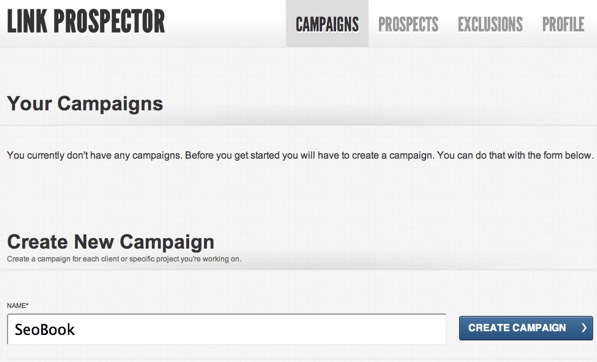
Move right into the prospects section:
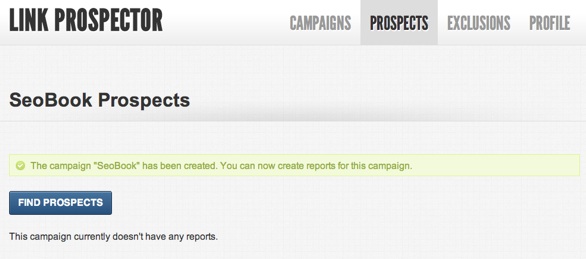
Start prospecting :)
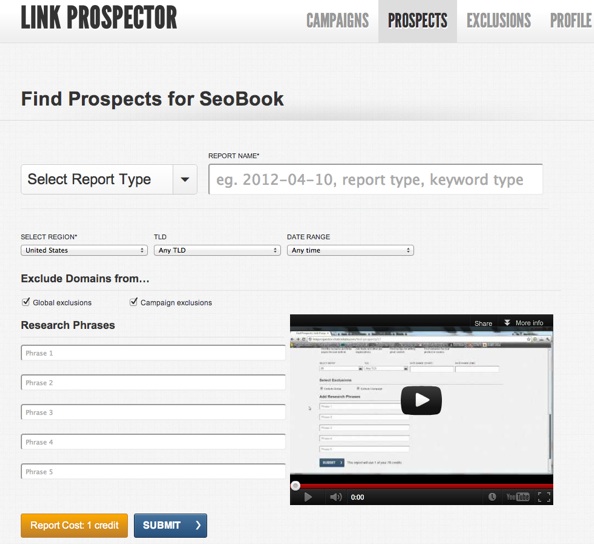
Selecting a Report
The nice thing about this tool is that it's designed for a specific purpose; link prospecting. It's not bloated with a bunch of other stuff you may not need and it's easy to use, yet powerful, because it focus on doing one thing and doing it very well.
The UI of this tool is right on the money, in my opinion. Garrett has built in his own queries to find specific types of links for you (preset Reports). Here you can see the reports available to you, which are built to help you find common link types:
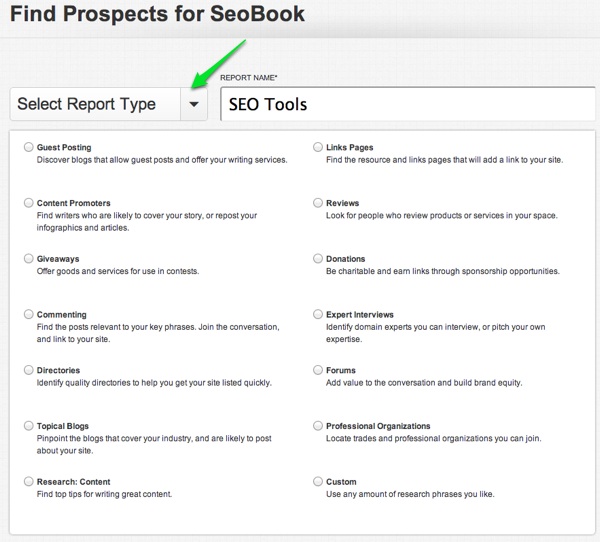
Customizing Your Prospecting
As you can see, there are a variety of built in queries available which run the gamut of most of the link outreach goals you might have (interviews, resource pages, guest posts, directories, and so on). Once you settle on the report type it's time to select additional parameters like:
- Region
- Web or Blog, or Web AND Blog results
- Search Depth (You can go up to 1,000 deep here, but if you make use of your exclusion lists you shouldn't have to dive that deep)
- TLD Options
- Date Range (Google's "past our, day, week, month, year, or anytime" options)
Try to make your queries as relevant but broad as possible to get the best results. Searches that are too specific will either net to few results or many of your direct competitors. Here, you can see my report parameters for interviews I may want to do in specific areas of SEO (Garrett includes a helpful video on that page, which I highly recommend watching):
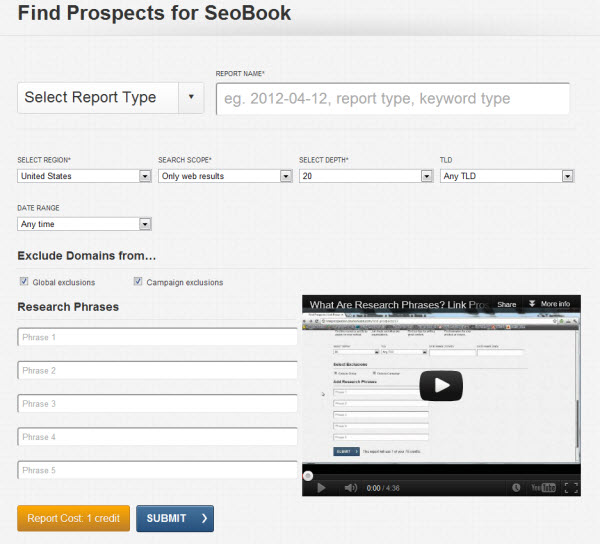
Using Exclusions
The use of exclusions is an often overlooked feature of this toolset. Brands are all over the SERPs these days so when you have the Link Prospector go out to crawl potential link sources based on keywords/queries, you'll want to make sure you exclude sites you are fairly certain you won't get a link from.
You may want to exclude such sites as Ebay, Amazon, NewEgg, and so on if you are running a site about computer parts. You can put your exclusions into 2 categories:
- Global Exclusions
- Campaign Exclusions
Global exclusions apply to each campaign automatically. You might want to go out and download top 100 site lists (or top 1,000) lists to stick in the Global Exclusions area or simply apply specific sites you know are irrelevant to your prospecting on the whole. To access Exclusion lists, just click on the exclusion option. From there, it's just a matter of entering your domains:
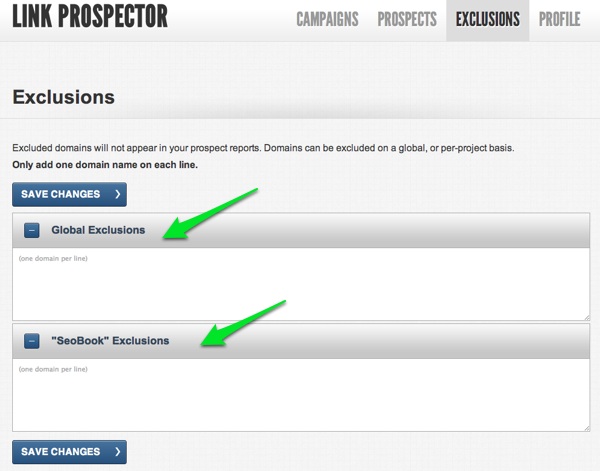
Campaign exclusions only apply to a specific campaign. This is good news if you provide link building services and work with a variety of clients; you are not constrained to one draconian exclusion list. In speaking with Garrett, he does mention that this is an often overlooked feature of the toolset but one of the most effective features (both Global and Campaign exclusions).
Working With the Data
So I ran my report which was designed to find interviewees within certain broader areas of the SEO landscape. The tool will confirm submission of your request and email you when it's complete, at any time you can go in and check the status of your reports by going to Prospects -> View Prospects. Here's what the queue looks like:

The results are presented in a web interface but can be easily exported to excel. From the web interface, you can see:
- Total Domains
- Total Paths (pages on the domain where relevancy exists, maybe we would find a relevant video channel on YouTube where it makes sense to reach out)
- TLD
- LTS - Link Target Score
- PR of Domain
- Export Options
LTS is a proprietary score provided by Citation Labs (essentially a measure of domain frequency and position within the SERPs pulled back for a given report).
If we expand the domain to see the paths, using Search Engine Land as an example, we can see pages where targets outside of the main domain might exist for our interviewing needs:
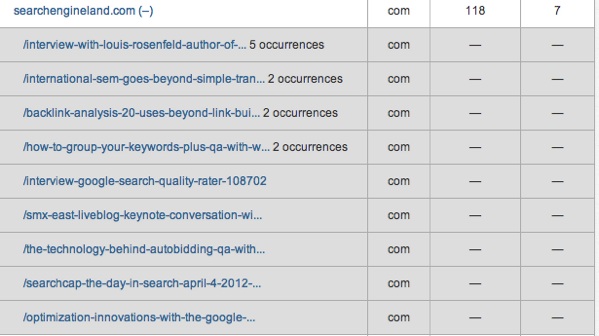
This is where Citation Labs really shines. Rather than just spitting back a bunch of domains for you to pursue at a broad level, it breaks down authoritative domains into specific prospecting opportunities which are super-relevant to your query/keyword relationship.
If you are on Windows (or run Windows via a virutal machine) you can use SEO Tools for Excel to take all these URLs, or the ones you want to target, and pull in social metrics, backlink data, and many other data points to further refine your list.
You can also import this data right into Buzzstream (export from Citation Labs to a CSV or Excel, then import into Buzzstream) and Buzzstream will go off and look up relevant social and contact details for outreach purposes.
We recently did a Buzzstream Review that you might find helpful.
You can also utilize Garrett's Contact Finder for contact research.
Creating Your Own Queries
Another nice thing about Citation Labs's Link Prospector is that you can enter your own query parameters. You are not locked in to any specific type of data output (even though the built in ones are solid). You can do this by selecting "Custom" in the report selection field
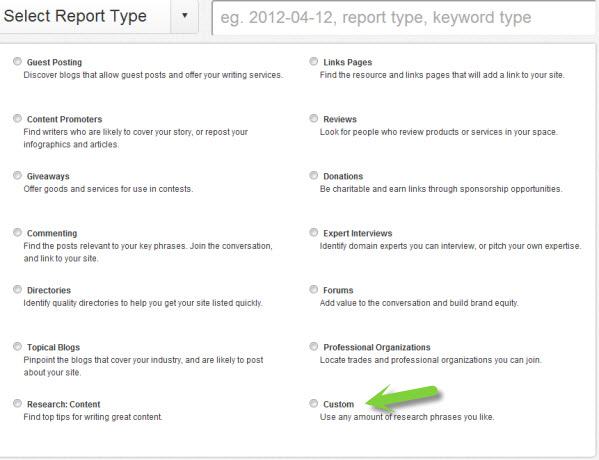
In the Custom Report area you can create your own search operators along with the following options:
- Region
- Web or Blog, or Web AND Blog results
- Search Depth (You can go up to 1,000 deep here, but if you make use of your exclusion lists you shouldn't have to dive that deep)
- TLD Options
- Date Range (Google's "past our, day, week, month, year, or anytime" options)
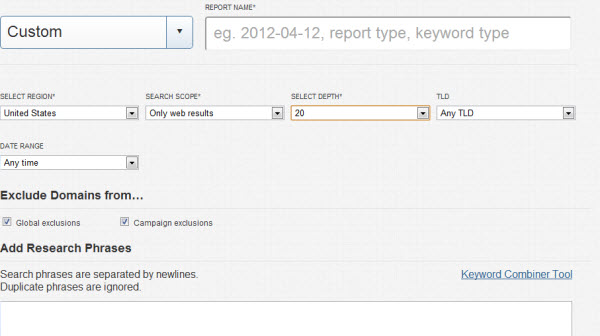
One of the tools we mention quite a bit inside the forums is the Solo SEO Link Search Tool. You can grab a lot of search operators from that tool for your own use inside the Citation Labs tool.
Garrett's Pro Tips
Can you give us some tips on using the right phrases?
One objection I hear from folks who test the link prospector is "my results are full of competitors." This is typically because the research phrases they've selected don't line up with the type of prospects they're seeking. And more often than not it's because they've added their target SEO keywords rather than "category keywords" that define their area of practice.The solution is simple though - you just need to experiment with some "bigger head" phrases. Instead of using "Atlanta Divorce Lawyer" for guest post prospecting, try just "Divorce Lawyer," or even "Divorce."
And I'd definitely recommend experimenting with the tilde "~Divorce" as it will help with synonyms that you may not have thought of. So if you're looking for guest posting opportunities for a divorce lawyer your five research phrases could look like this:
divorce
~divorce
~divorce -divorce
Divorce ~Lawyer
"family law"
The link prospector tool will take these five phrases and combine them with 20+ guest posting footprints so we end up doing 100+ queries for you. And there WILL be domain repetitions due to the close semantic clustering of these phrases. This overlap can help "float up" the best opportunities based on our LTS score (which is essentially a measurement of relevance).
All this said there are PLENTY of situations where using your SEO keywords can be productive... For example in guest posting it's common for people to use competitive keywords as anchor text. You could (and yes I'm completely contradicting my example) use "Atlanta Divorce Lawyer" as a guest posting research phrase along with your other target SEO KWs. The prospects that come back will probably have been placed by competitors.
How do you fine-tune your research phrases?
I often test my research phrases before throwing them in the tool. Let's go back to the divorce guest posting example above. To test I simply head to Google and search [divorce "guest post"]. If I see 4 or more results in the top 10 that look like "maybes" I consider that a good keyword to run with. The test footprint you should use will vary from report-type to report-type.
A good links page test is to take a potential research phrase and add intitle:links. For content promoters you could combine a potential research phrase with intitle:"round up".
I find that this testing does two things. For one it helps me drop research phrases that are only going to clog my reports with junk.
Secondarily I often discover new phrases that are likely to be productive. Look back at the list of divorce research phrases above - the last one, "family law," is there because I spotted it while testing [~divorce "guest post"]. Spending time in Google is always, always productive and I highly advise it.
What tips can you give us regarding proper Search Depth usage?
Depth is a measure of how many results the link prospector brings back from Google. How often do you find useful results on the third page of Google? How about the tenth page? There's a gem now and again, but I find that if I've carefully selected 5 awesome research phrases I save time by just analyzing the results in the top 20.
Your mileage may vary, and the tool DOES enable users to scrape all the way down to 1000 for those rare cases where you have discovered a mega-productive footprint. Test it once for sure, don't just take my word for it - my guess is you'll end up with tons of junk that actually kills the efficiency that the tool creates.
Any more expert tips on how to best use phrases and search operators?
You can addadvanced search operators in all your research phrases. Combine them with your research phrases and try them out in Google first (see tip 2) and then use them as you see fit. I use the heck out of the tilde now, as it saves me time and aids in research phrase discovery when I vet my phrases in Google. The tilde even works in conjunction with the wildcard operator (*).
So if you're looking for law links pages you could test [~law* intitle:links] and then add ~law* as one of your research phrases if it seems productive. It's not super productive by the way, because the word "code" is a law synonym... but I wouldn't have known if I didn't test, and if I didn't test I'd end up with link prospetor results that don't have anything to do with the targets I'm seeking.
Any tips on how to best leverage Exclusions (beyond putting in sites like google.com into your Global Exclusions :D )
If you have junk, not-ops that keeps turning up in your reports, add the domain as domain.com and www.domain.com to the exclusions file. Poof. It's gone from future reports you run.
You can even add the domains you've already viewed so they won't show up anymore. Be careful though - make sure you're adding them to your campaign-level excludes rather than Global.
How often do you update the tool and what is coming down the pike?
If you sign up and you find yourself asking "I wonder what would happen if I..." please write me an email. If I don't have an answer for you I will send you credits for you to do some testing. I will end up learning from you. I have users continually pushing the limits with the tool and finding new ways to use it.
We've added PR for domains, titles and snippets for each URL, blog-only search, and fixed numerous bugs and inefficiencies based on requests from our users. We're also bringing in DA, MozRank and an API because of user requests.
Thanks Garrett!!
Free Trial and Pricing
Citation Labs is currently offering a free trial. They have monthly and per credit (love that!) pricing as well. You can find their pricing structure here.




Comments
RE : Whatever it is and whatever sub-definitions exist for the process of finding quality, related websites to link back to yours is difficult and time-consuming work.
Agreed, however also often the most fun, catch being depends on the topic of clients website, for areas personally find boring, a lot more challenging and becomes a chore.
This looks like a really amazing tool. Maybe a little tedious though, it would make sense for a link building employee to utilize. Thanks for sharing!
Add new comment